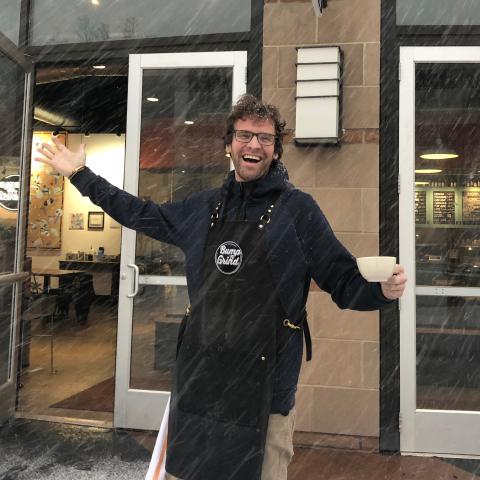
David Fogel standing outside Bump ‘n Grind, his coffee shop and record store, prior to its relocation. Photo Credit: David Fogel
David Fogel thought he would never again be able to enjoy ice cream or chocolate cake after his stomach was removed in 2017. That didn’t matter to him, though, if it meant avoiding stomach cancer, a disease that he and several of his family members were likely to develop. Now, six years following the life-altering procedure, he can down an entire hamburger, with fries.
When David was in his mid-twenties, his aunt passed away from stomach cancer, marking a significant moment for him and his family. They didn’t know it at the time, but she carried a genetic mutation in the CDH1 gene — a mutation that increased her chance of developing the disease by up to 80%. Many years later, David learned that he too carried the genetic anomaly.
Without hesitation, the father of two young children enrolled in a study at NIH, which included having his stomach removed in a preventive surgery. Recently, David returned to NIH for his six-year checkup with Jeremy L. Davis, M.D., Associate Research Physician in the Surgical Oncology Program, who leads the ongoing study.
“I continue to be amazed at how little of an impact the surgery has had on my day-to-day life,” David said. While much of his routine has returned to his pre-surgery norm, maintaining his weight has been his greatest challenge. “I’m skinny, but I’m not marathon-runner skinny,” he joked, “and I’m never going to have a dad bod, which I’ve gotten over.”
Removing his stomach forced him to maintain a deliberate diet, complete with ample protein and reduced sugar, and he takes five pills a day to supplement his nutrients. He emphasized, though, that mindful eating is important for anyone. Sometimes he becomes uncomfortable after a meal, “but everybody unbuttons their pants during Thanksgiving dinner,” he chuckled.
David was one of Dr. Davis’ first patients on the study, which began in 2017 and has enrolled about 700 people to date — an incredible number of patients given the rarity of the cancer. This is a natural history study, Dr. Davis explained, meaning that researchers actively learn about this rare disease by monitoring patients over time and collecting detailed information about their personal history and cancer biology.
The work is critical. Many people who are diagnosed with stomach cancer in the United States — which is estimated to be around 28,000 people per year — receive their diagnosis after the cancer has spread to other sites in the body. At this advanced stage, available treatments are not as effective, and only about a third of these patients are alive five years after receiving their diagnosis.
Not all patients on Dr. Davis’ study choose to undergo surgery. “We have a lot of people on the study who want to keep their stomachs, and we’re happy to honor their choice. On this path we can study effective surveillance methods for stomach cancer,” he explained. Even as a trained surgeon, much of Dr. Davis’ research focuses on finding ways to prevent stomach cancer without removing the stomach.
When David approached Dr. Davis, he knew he wanted his stomach removed. As a young father and business owner, David wanted to spend time with his family and grow his business, not think about cancer. So, without a stomach, that’s exactly what he did. In 2020, David built and opened a coffee bean roasting facility in Kensington, Maryland, to supply Bump ‘n Grind, his local coffee shop and record store. Today, he is in the process of renovating a house that will become Bump ‘n Grind’s “forever home” after its original location shuttered during the pandemic. They plan to open in spring 2024, but in the meantime, you can catch David at the downtown Silver Spring library or during Saturday “pop-ups” at his roastery in Kensington.
While David was making progress in his business, Dr. Davis was using David’s stomach to make significant advancements in his research. “People like David present an opportunity for us to study the earliest stages of stomach cancer development,” Dr. Davis said. “I think what’s exciting is that David’s story marks a different time, and now, just several years later, we have so much more information because of people like him." He hopes that their team will have better treatment options for David’s kids, whom David plans to test for the CDH1 mutation when they’re older.
Dr. Davis and David, who are now friends who text each other during football season, continue to meet every year to talk about David’s health and well-being. David also stressed the importance of meeting with the team’s dietician, who helped guide the dietary aspects of his aftercare following the stomach surgery and was an integral part of David’s recovery. “I can’t stress enough how fortunate I was to be able to be a part of this world at NIH,” David said.
Knowing that his wife and children won’t experience what he did with his aunt is a great relief for David. The NIH research team did eventually find cancer cells in David’s stomach, but it is unclear if those cells would have grown and spread or remained in something like a pre-cancerous state. Either way, he doesn’t need to think about that now. That’s a job for Dr. Davis and his team.